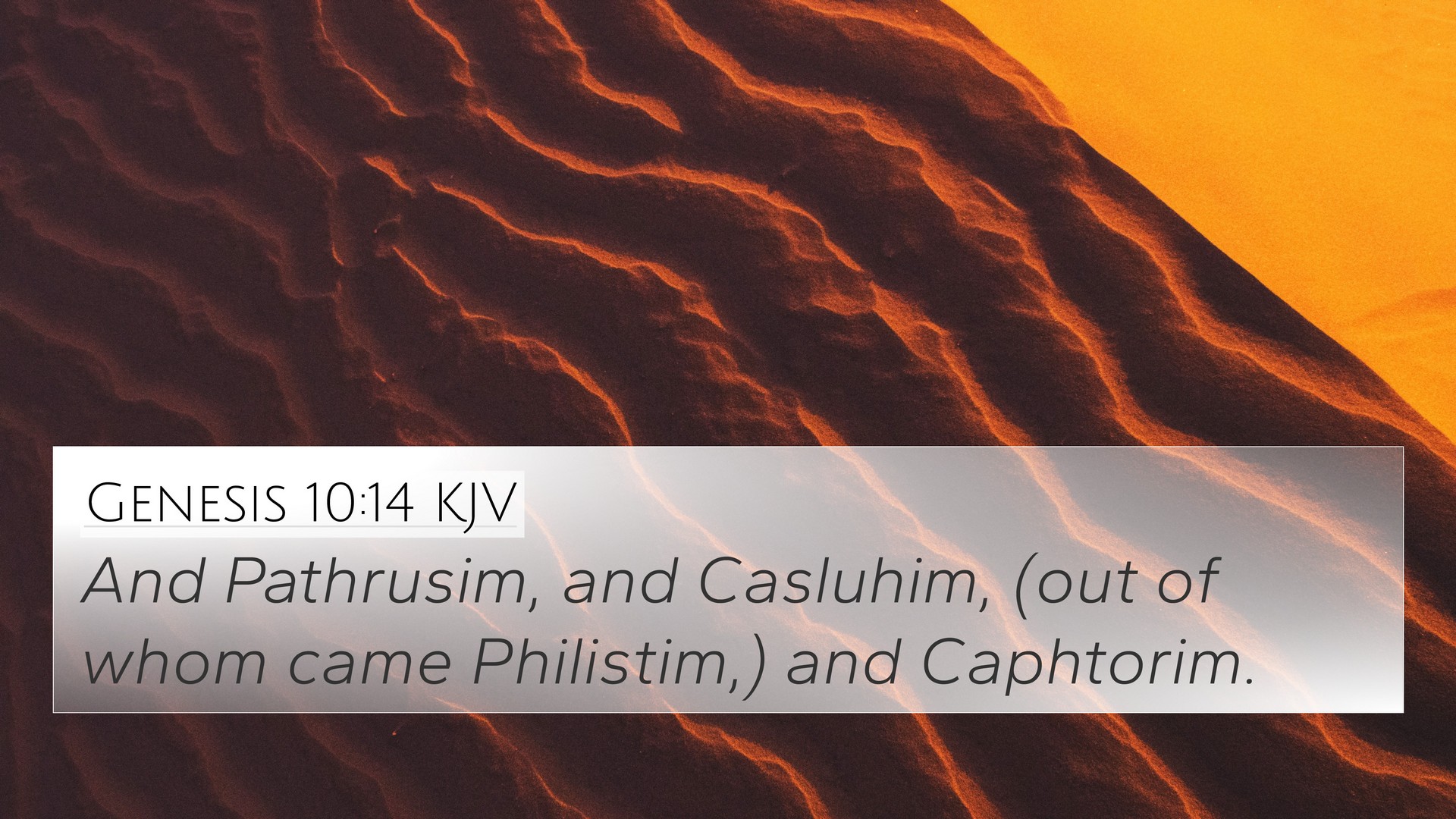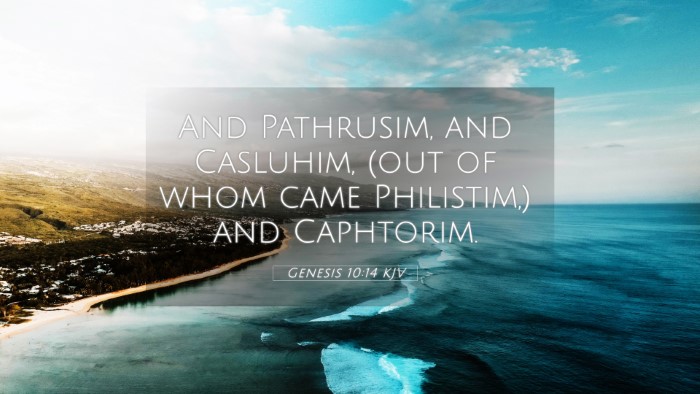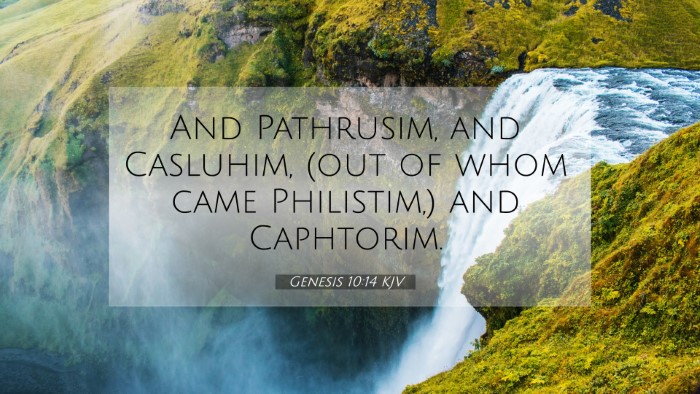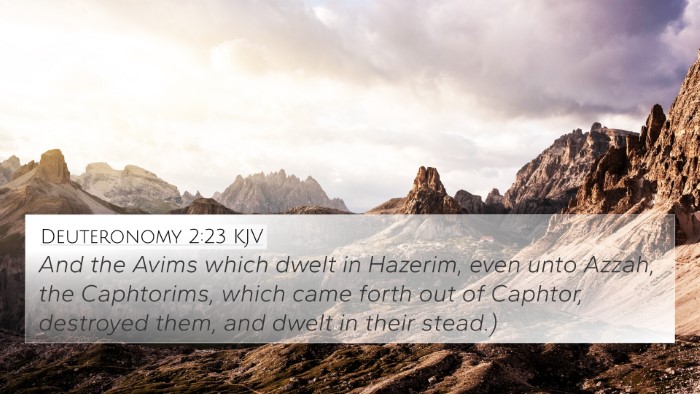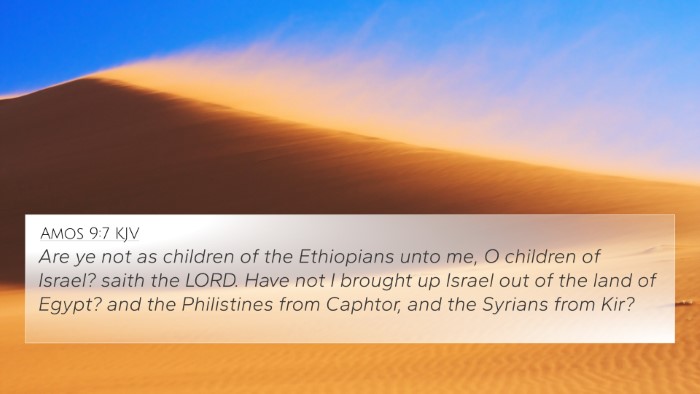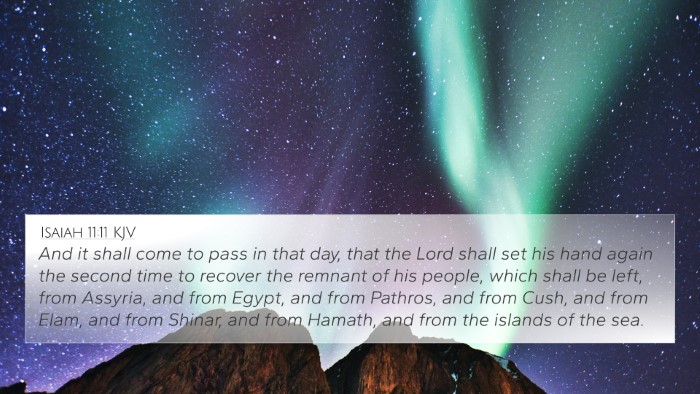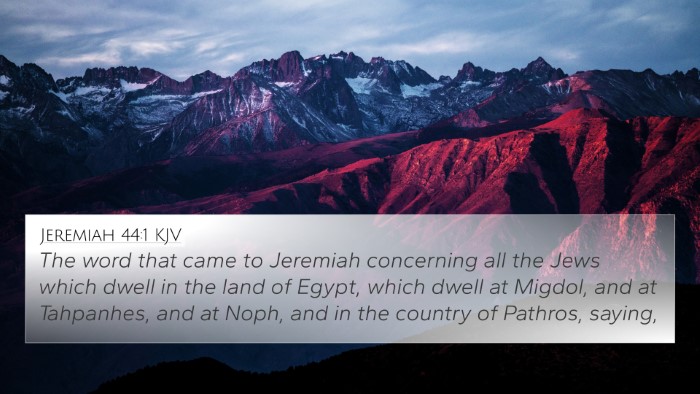Understanding Genesis 10:14
Genesis 10:14 says, "And Pathrusim, and Casluhim, (out of whom came the Philistines,) and Caphthorim." This verse is part of the genealogical record given in the Book of Genesis, specifically discussing the descendants of Ham and the nations that emerged from his line. In this summary, we will explore the meaning of this passage through insights gathered from public domain commentaries.
Meaning and Interpretations
The genealogies in the Bible serve several purposes, including establishing historical lineage, identifying tribes and nations descended from a common ancestor, and highlighting God's providential plan through these lineages. In Genesis 10:14, we specifically see the references to the Philistines and their origins, which are essential for understanding the historical and cultural context of Israel's encounters with them later in Scripture.
Commentary Insights
-
Matthew Henry's Commentary:
Henry emphasizes the significance of genealogies in the Bible, remarking that they are not merely lists of names, but they reflect the unfolding of divine promises and historical realities. He notes that the mention of "Philistines" is crucial, signifying their future role as adversaries to Israel and their continual conflict with the people of God.
-
Albert Barnes' Notes:
Barnes provides a linguistic analysis, explaining the origins of the names mentioned. He highlights that Pathrusim refers to the people of Upper Egypt, and the connection to the Philistines indicates their migration and settlement patterns. This illustrates the movements of tribes and nations during that period, underpinning the Bible's historical context.
-
Adam Clarke's Commentary:
Clarke points out that connection to the Philistines is notable for understanding their adversarial role in the historical narratives of Israel. He delves into etymological details, explaining how these names fit within the broader concept of the dispersion of peoples after the Tower of Babel, thus reinforcing the theme of God’s sovereignty over the nations.
Related Bible Verses
Genesis 10:14 connects with several other Scripture passages throughout the Bible. Below are noteworthy cross-references:
-
Genesis 10:1-5: The broader context of the descendants of Noah and the nations derived from his sons.
-
Exodus 13:17: Mention of the Philistines indicating their significance in the journey of the Israelites.
-
1 Samuel 5:1: The Philistines are noted as rivals to Israel, presenting insight into their historical enmity.
-
Amos 9:7: Acknowledges the Philistines and their historical context, providing prophetic depth.
-
Zephaniah 2:5: Prophecies regarding the Philistines and their future significance.
-
Psalms 60:8: Refers to Philistia, indicating the ongoing relationship and conflict between Israel and the Philistine people.
-
Jeremiah 47:1: Prophecies against the Philistines reflect on their role concerning Israel's history.
Thematic Connections
The connections present in Genesis 10:14 raise important themes in the narratives of the Old Testament, such as the tension between Israel and the Philistines. By studying these verses, readers may engage in a comprehensive Bible cross-reference study to understand how different Scripture passages interact to tell a cohesive story.
Given the Context
Understanding Genesis 10:14 within the wider tapestry of biblical history allows for the identification of recurring themes about nations, divine judgment, and God's chosen people. The Philistines serve as a prominent example of the nations that shaped Israel's history, and their presence is woven throughout various biblical narratives that illustrate God’s sovereignty and His plan for redemption.
Conclusion
In examining Genesis 10:14, one recognizes the richness of genealogical records in Scripture. They not only provide a historical account but also connect various biblical themes and narratives, emphasizing the significance of nations in the biblical narrative and God's overarching plan of redemption. By utilizing tools for Bible cross-referencing, such as a Bible concordance or a Bible cross-reference guide, individuals can further explore these connections.
Recommended Study Approaches
- Utilize a Bible reference resource to locate cross-references.
- Engage in a cross-referencing Bible study method to draw parallels and thematic connections.
- Explore a comparative analysis of similar passages regarding nations and their roles in biblical history.
By exploring Genesis 10:14 and related verses, readers will deepen their understanding of Bible verse parallels and engage more fully in cross-referencing biblical texts through diligent study and reflection.
